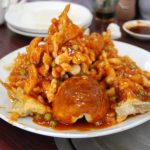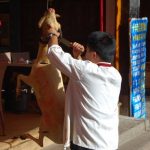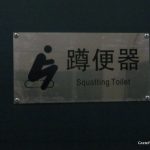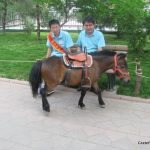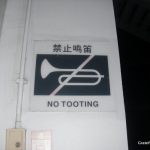For anyone coming to China, a bit of culture shock is inevitable. Hell, even other Asians are shocked when they get to China.
In a country that’s been around for over 5,000 years but only open to the outside world for less than 50, China sure has its fair share of quirks and eccentricities. Whether it’s the lack of privacy (or a seat, for that matter) in the bathrooms, something odd and still moving on a stick, fighting for a seat on the bus, or drinking that horrendous rocket-fuel that passes for liquor here, culture shock is around every corner in China.
In an effort to better prepare you for your visit or move to China, here’s a short guide to dealing with culture shock:
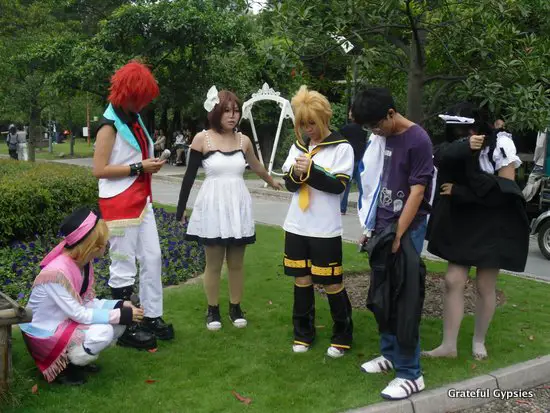
Eating
The Food

When you hear the phrase “Chinese food,” what comes to mind? If it’s General Tso’s chicken, egg rolls, crab rangoons, and fortune cookies, you may be surprised to find that none of those things exists in China. You won’t find sweet & sour chicken on the menu here, but you will definitely find plenty of chicken organs.
Whereas Americans basically only eat breasts, wings, and thighs, Chinese will also dig into the liver, heart, and especially the feet. There’s an old Chinese belief that eating an animal organ will benefit your corresponding organ – eating a heart is good for your heart, eating a brain will make you smart, and eating an animal’s penis will, well you get the idea. Think I’m joking? There’s an entire restaurant dedicated to serving up animal penis in Beijing, and it’s extremely popular and expensive.
Take a walk at night in any Chinese city, and you’re sure to encounter all sorts of odd foods and aromas that you’ve never experienced before – pig’s brain, stinky tofu, and duck neck are all popular snacks here. This is great for the adventurous eater, but for most people it takes some getting used to.
Eating Habits
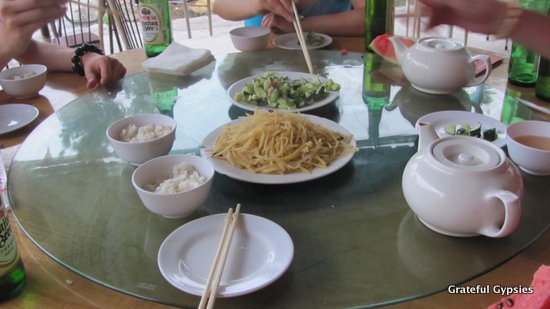
It’s not just the food that’s different in China, but also how people eat. Of course, for most Westerners the idea of using chopsticks for every meal is a totally foreign concept. Dining out is also a totally different experience in China than it is in the West. Here are just a few examples:
- Family style dining is more common, with many dishes placed on a Lazy Susan and shared.
- Cold dishes serve as appetizers, followed by a wide array of mains and staple dishes.
- In a Chinese meal, soup usually comes last.
- The waiter will literally wait over your shoulder as you peruse the 50+ page menu.
- It is totally acceptable to: yell for your waiter, slurp your noodles, spit on the floor, smoke, and get absolutely, belligerently drunk at dinner.
- There is no tipping in China. Also, Chinese people tend to fight over the bill rather than go Dutch.

Meal time is always fun in China!
Drinking
Types of Drinks
One noticeable difference between China and back home is that cold drinks just really aren’t big here, even on a hot day. No matter the temperature, Chinese people carry around their bottle full of scorching hot tea. An ancient Chinese belief says that cold drinks are bad for your qi (inner energy), and people still give me funny looks when I put ice in my water. It’s not only the temperature that’s different here, but the drinks themselves.
As an American, I’m used to having milk for breakfast – cold milk, from a cow, in my cereal. That’s not the case here in the Middle Kingdom, where the most popular milk for breakfast is soy milk, and it’s usually eaten alongside a hot bowl of porridge and a few steamed stuffed buns. In Beijing, a famous snack is mung bean milk, a sour and funky smelling drink made from the remnants of the mung bean noodle making process.
As you may expect, tea is far and away the most popular drink – it’s everywhere you look. Green tea, black tea, red tea, iced tea, any kind of tea you want. One drink that you’ll see in just about every Chinese restaurant is Wong Lo Kat, a kind of herbal tea that is sweet and helps cool you down during a hot pot meal. Coffee is gaining ground here, but it’s mainly just for middle-class Chinese to show off and be trendy. Tea is and always will be king in China.
Drinking Culture

The concept of casually having a drink at a bar while chatting is completely alien to Chinese people. Drinking is anything but a casual affair in China; it’s actually quite intense. When it’s time to drink in China, it’s time to drink in China. Cheers is Chinese literally means “dry glass” (干杯 – gān bēi), and that’s exactly what you’re supposed to do when somebody says it.
Drinking beer with Chinese men often quickly escalates into a drinking contest, as they’re always pumped up about the possibility of out-drinking a foreigner. Of course, that never happens. Chinese guys tend to turn red after just a few beers, and they get high-school girl drunk if they put down a sixer. Beer is just the warmer, however – the main event comes in the form of Chinese liquor.
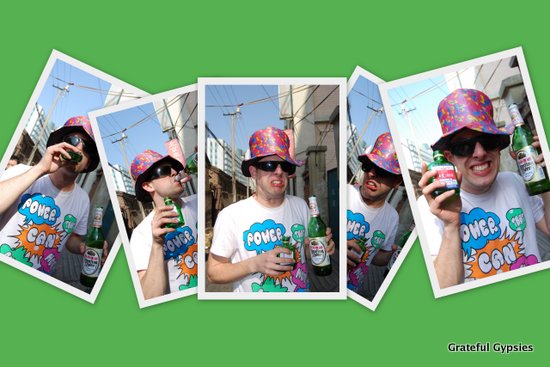
Chinese spirits, known as “bai jiu” (白酒 – bái jiǔ – lit. “white liquor”), are made by distilling sorghum. The end product looks like vodka, but the similarities end there. I like to call bai jiu rocket fuel, because you feel like you could take off for the moon after a big sip.
At first it doesn’t taste so bad, but then the aftertaste leaves you scrambling to find something anything to help get rid of it. One small sip of the stuff will leave me wincing and squirming, desperately grabbing for a bottle of Coke or some food to destroy the foul taste. Meanwhile, the old Chinese man next to me casually takes a huge gulp, lights up a smoke, and goes about his business as if nothing happened.
The idea of chasing booze or using it in a mixed drink is still a very new idea over here; most people just drink the stuff at room temperature, straight, no chaser. Go to a Chinese banquet or wedding, and you will see people getting irresponsibly trashed as they tip glass after glass of bai jiu. If you plan on doing any kind of business in China, you’d better get used to drinking this stuff, as marathon bai jiu drinking is synonymous with meetings and business deals here.
Bathrooms
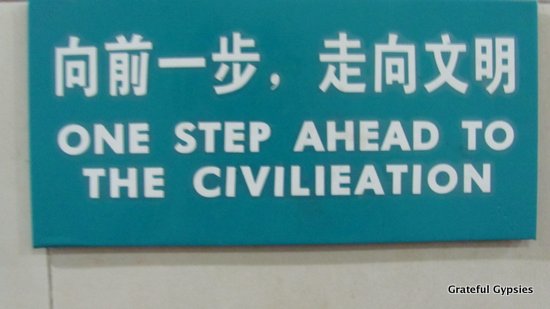
For Westerners visiting the Middle Kingdom, their first stop in a Chinese latrine can be downright terrifying. Don’t expect a nice porcelain throne tucked away in a private stall and stocked full of TP here. Instead, you’re almost definitely going to find a squatty potty. What’s that, you ask? Well, sometimes pictures are better than words at explaining things:
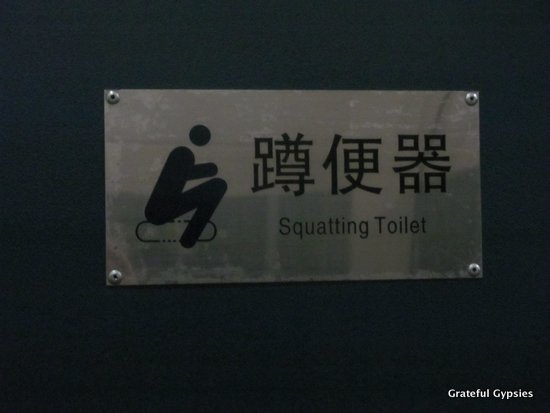


Approaching this thing for the first time can be quite intimidating. I had one friend get completely naked, sans his socks and shoes, before attempting to use one. Some people just refuse to even try and do everything in their power to avoid having to squat. I once had a colleague tell me he’d walk 20 minutes back to his apartment from work in favor of using the school’s facilities.
If you’re lucky, there will be an actual stall with a door that you can lock for a little privacy. However, in most public restrooms, you’ll only find a small wall on either side of the toilet – no doors here. Think of a voting booth without the curtain, or the voting. Basically, take your average Western bathroom, remove the toilet, doors, and toilet paper, and you’ve got the Chinese version. Say goodbye to privacy, and get used to watching other people go to the bathroom while they watch you. I’m not sure about the ladies’ room, but at least for guys you can expect to share the space with Chinese men who yell into their cell phones, smoke, and read the newspaper. I do my best to divert my eyes, take care of business, and get the hell out of there.
Did I mention that China is a BYOTP society? It’s true. Always make sure to carry a few packets of tissue with you, because you will not find even a shred of toilet paper in a Chinese bathroom. Forgetting to bring your own can land you in some sticky situations out there. Sometimes after eating a big plate of spicy and oily ma la tang, nature calls and you have to answer. Without any TP, you might just have to get creative – 1 RMB notes, socks, and other odd objects have to be considered to get the job done. Here’s one particularly funny exchange I had with a friend one day when one of us ended up in this less than desirable situation:
“Hey. I’m wiping my ass with your lesson plans.”
“Literally or figuratively? I do make some pretty shitty lesson plans.”
“Literally. No TP in here and it’s the best I could find.”
“It’s alright. That’s probably a better use for them anyways.”
After such a traumatic experience, all you want to do is wash your hands thoroughly. Once again, you’re SOL in a Chinese bathroom – no soap anywhere here. Make sure you carry a small bottle of hand sanitizer with you if you’re going out in China. A small bottle of whiskey might not be a bad idea, either – it’ll help you forget about what you just went through.
Habits
Split Pants
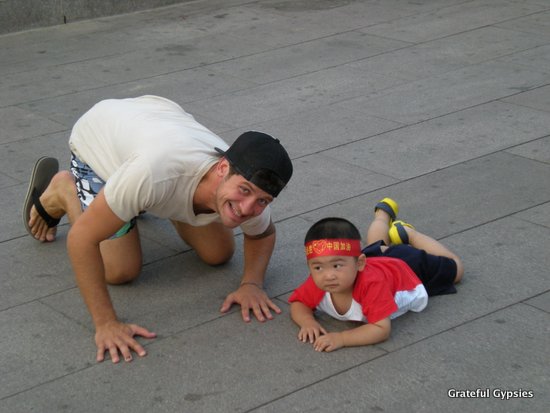
Speaking of bathrooms, you may quickly notice in China that the sidewalk doubles as a toilet for young children. Diapers are still considered a luxury item here, with many Chinese parents choosing to dress their Little Emperor in split pants instead. “What are split pants?”, you may be asking yourself. They’re just what they sound like – pants with a split down the middle. There are lots of exposed baby butts running around China, free to relieve themselves whenever and wherever they please. Be careful when walking around here, because that turd on the sidewalk may not be from a dog.
What Line?
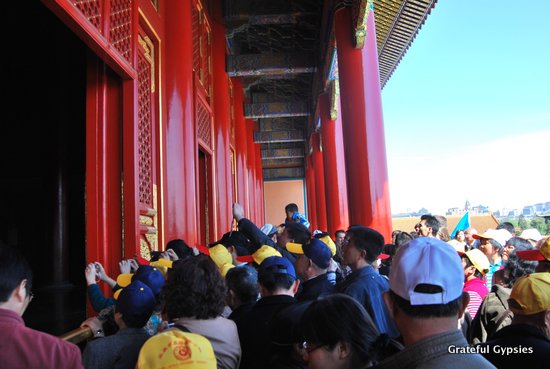
Simply put, China fails at lining up (or queuing up for our British friends). It’s not so much a line as it is a mass of humanity pushing and shoving one another. It doesn’t matter if you’re waiting to have your fruits and veggies weighed in the market, buy a ticket, or get on the bus – there is no such thing as an orderly line in China. As if the lack of organization isn’t bad enough, Chinese people are also notorious cutters. This aggravates me to no end, and I’ve learned quite a few ways to scold and single out these line jumpers.
Smoking is Still Cool

I often tell people that China today is like America in the 1950s – everyone is getting their first car, the middle class is growing, and smoking is still cool. It’s like the freaking set of “Mad Men” here – people light up everywhere. Just ponder these stats for a minute:
- One out of three cigarettes is smoked in China.
- There are more than 350 million smokers in China. That’s more than the population of the US.
- One million deaths a year occur in China due to tobacco use.
- The most sold brand of cigs only costs 5 RMB (about $0.75) a pack.
While “no smoking” signs are hung in just about every establishment here, they are blatantly ignored and never enforced. I often joke that you can even smoke in a children’s hospital here, but sadly I bet you some people actually do.
Smoking is a huge part of the business culture here, especially for men. Over 50% of Chinese men smoke, meaning they’ll go ahead and assume that you do, too. If you’re a dude living or traveling in China, be prepared to be offered cigarettes all the time. As it’s considered rude to refuse a gift (which therefore causes someone to lose face), it’s best to just accept it, take a puff or two, and just let it burn down. Smoking is also a direct cause of the next item…
Loogies and Snot Rockets Galore
As you now know, Chinese men love smoking, and they also breathe in disgustingly polluted air every day. As a result, lots of nasty stuff builds up inside. When it comes to disposing of this, any place is fair game. Walk around Beijing for half an hour, and you’re guaranteed to witness an old man hock a disgusting loogie or even worse, blow a giant snot rocket. Consider buying a bike, because there are far too many bodily fluids you have to dodge on the sidewalk. Speaking of getting around, that’s next on our list.
Getting Around
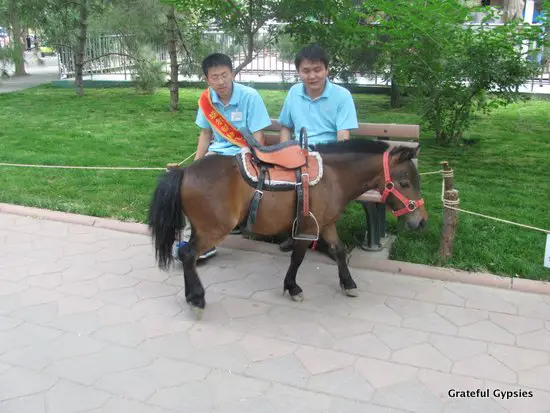
For me, the culture shock that comes with getting around China was quite immediate. When I first arrived in Beijing, a van was waiting at the airport to escort me and some other guys from the group to our apartment. We were all exhausted and jet-lagged from the long trip, but the adrenaline rush of being in China kept us awake and talking. It was a long ride, but we managed to make it in under an hour. This was thanks to the fact that our driver was a complete maniac – gunning it every chance he got, swerving in and out, and completely ignoring any kind of road etiquette whatsoever.
Fearing for our lives, we were excited to hear that the exit was approaching. Of course, our driver blew right past it. “Oh well,” I thought. “We’ll just get off at the next exit and turn around!” Not so fast. After all, This is China (TIC). Our driver flipped the van into reverse, and sped backwards, on the freeway, until he got to the correct exit. As you can imagine, my first experience with getting around in China left a lasting impression.
Chinese Drivers – Affirming Stereotypes Every Day
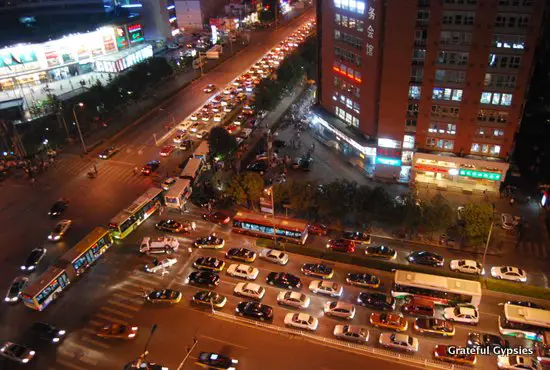
When it comes to driving in China – especially in the big cities – it is absolute madness. Green means go and red means stop, but yellow does not mean slow down. It means speed up and get through. When a light does turn green, the cars coming straight through have to wait while other impatient jerks make a quick dash to turn left.
Neither cyclists nor pedestrians have the right of way, as cars weave in and out of bike lanes and make turns quickly without even looking. You’ll often see cars going the wrong way down a road, parked on the sidewalk, or making the classic “U-turn from the far right lane” move that is so popular here.
In short, it is a miracle that there aren’t thousands of accidents a day. Some stereotypes are true for a reason – Chinese people really aren’t the best drivers.
Maniacal Bus and Cab Drivers
If you thought cars were bad, just wait till you get a load of the buses. Bus drivers try their best to get through their route quickly, and they have no patience for anyone or anything that is in their way. If you see a bus coming, don’t assume that they will stop for you – you’ll be road kill before you know it. Cab drivers are just as bad, if not worse. Driving around a Chinese city for 12 hours a day will do that to you, I guess.
Symphony of Horns

No matter where you are and what kind of vehicles are around, get used to hearing the constant sound of car horns blaring. Chinese people honk before they pass to warn you. Then they honk while they are passing to make sure you know you were going too slow. Finally, they give you one more victory honk after they have passed as a big “F you!” In any Chinese city, rush hour is a symphony of car horns that goes on for hours and hours.

Complete and Utter Chaos
So the drivers are nuts, but how about the cyclists and pedestrians? They must at least be pretty good, right? Nope. Traffic lights mean nothing to people walking around in China. Even with a constant stream of cars, taxis, and buses speeding towards them, they ignore the fact that the light is red on their side and continue to walk into the middle of the street. This, of course, causes cars to slam on their breaks and their horns, and it just makes everything that much worse. Meanwhile, you’ve got entire families flying up the road on the wrong side on electric bikes – dad driving, mom on the back, and child clutching on for dear life. Naturally, none of them are wearing helmets. Then there are the rickshaw drivers and people on carts who are selling street food or transporting junk. In conclusion, it is complete and utter chaos out on the streets here.
Just as Bad Underground
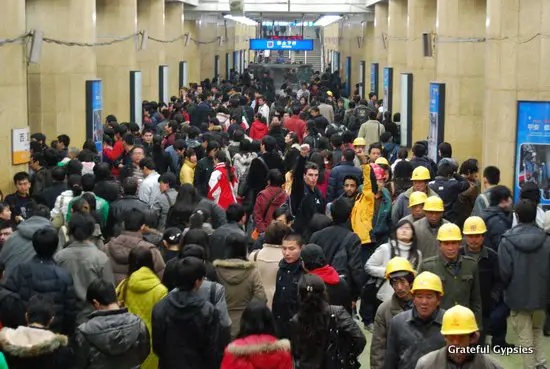
With all this madness out on the road, you’re probably better off heading underground to take the subway, right? Not so fast. Although there are plenty of subway lines, they are still not even close to enough for the massive population. As such, you will find huge crowds any time of day. There are plenty of ads and announcements in subway stations reminding people to “be civilized,” “stand behind the yellow line,” “first get off, then get on,” and “give up seats to those in need.” The Beijing subway, however, is far from civilized. As soon as those doors open, people begin pushing their way on. Be prepared to throw some ‘bows if you want to get a seat, let alone get on the subway at all.
“It’s So Stupendous, Riding the Beijing Tube”

How to Cope
While it’s true that the initial culture shock can be a bit overwhelming, it’s best to embrace the differences rather than bemoan them. That being said, here are some ways we learned to cope:
Eating – Nowadays, even in smaller cities, you can find shops selling your favorite comfort foods including cheese, decent wines, good coffee, normal flavored chips, cereal. Fresh meats, vegetables and fruits can be bought in local super markets for very cheap. We cooked at home most days of the week and saved going out to Chinese restaurants for special occasions with friends or when we just didn’t feel like cooking. This way you don’t have to eat with chopsticks every meal. Some friends who hated chopsticks would carry around a plastic fork and spoon. You could try this as well if you really can’t figure out chopsticks.
Drinking – With more and more foreigners moving to China they have made efforts to have cold drinks in the summer time. So don’t worry so much about there only being hot drinks. You can buy normal milk in the shops and you don’t have to drink tea. There are many Western style bars where you can casually drink and mingle as you would at home. You don’t have to participate in the competitive drinking with locals, but it’s not a bad thing to try if you want to be friends with them.
Bathrooms – I will admit when I first moved to China I was not a fan of the squatty toilets. But over time I got used to it and now I almost prefer pooping in a squatty. It’s scientifically proven to be better for you anyways. Most places you go will have Western style toilets, though. It’s mainly in super old local neighborhoods and train stations that you will only find the squat toilets.
Getting Around – Buy an e-bike or bicycle. This seriously saved my time in China! Sure you still have to deal with the crazy drivers on the road, but it’s better than getting pushed around on the subway and buses. It’s better for the environment too.
Just remember you are in a country of 1.3 BILLION people. No where else in the world is as crowded. After all, if things in China were exactly the way they are at home, wouldn’t that be a little boring? You didn’t move to the other side of the world for comfort and familiarity. So, grab some weird shit on a stick, wash it down with a shot of bai jiu, fight for your seat on the subway, and practice your squatting technique. After all, TIC (This is China) – they sure as hell ain’t gonna change for you, so you might as well do your best to get used to it. Dealing with the culture shock will be a lot easier if you learn a little Chinese.





